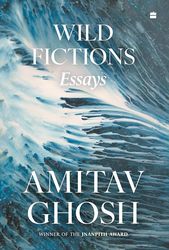Interview/ Amitav Ghosh, writer
On a chilly morning in Gurugram, as I sit down to chat with Amitav Ghosh about his latest book Wild Fictions, my first question is about the recent wildfires in Los Angeles, which seems almost prescient since Ghosh had written about a wildfire approaching LA’s Getty Museum in his 2019 novel Gun Island. Although he chuckles at that, he points out, “You don’t have to predict that something like this would happen in LA. The city is essentially built on a desert, with water that has to be pumped in from several miles away. The weather also swings between extremes. Last year, it experienced massive flooding, which many thought was good as the city would at least have water. However, what the flood does is that it triggers an enormous growth of underbrush, which when subjected to another drought, becomes fuel for the wildfire.”
His writings on environment and climate change, for which he recently won the Erasmus Prize, feature prominently in his new book—a collection of his essays, articles, blog posts, speeches, and presentations over the past two decades. However, Wild Fictions features other topics, too—like colonisation and migration. For example, he writes about a new kind of migration, fuelled not by poverty, political upheavals or war, but by the internet and social media.
In the interview with The WEEK, he spoke about the book, his thoughts on the genre of ‘cli-fi’, and whether writing on pressing issues ever gets depressing.
Q/ How was the experience of revisiting your work, some of it dating back to 1999?
A/ It was very interesting to see what I was thinking 25 years ago and see all the continuities. Some of the pieces remain relevant even today, which was interesting.
While there was no particular theme that I was going for here, because my interests are quite varied, which is reflected in the book, several of the pieces have come out of my research for other books. However, one of the most interesting aspects was turning my blogs and presentations, which are essentially pictures, into something closer to essays.
Q/ “Much, if not most, of my work is about migrants and displaced people,” you write in the book. What got you interested in this, and what has kept you hooked?
A/ It is borrowed from my own experience. I come from a family of migrants who were forced out of their village in Bangladesh by a flood. They first settled in Chapra, Bihar, and then migrated to Calcutta. All my cousins are now scattered around the world.
However, what was different for me was that I started writing about the migrant experience very early on. My first novel, The Circle of Reason, was about Indian workers in the Middle East. In fact, in The Ibis Trilogy, I wrote about indentured labour, many of whom migrated from Bihar.
Q/ You write about indentured labour and Indian soldiers in the British Army who were sent outside India to fight wars they had no connection with. These stories seldom find mention in history books, let alone in fiction. How has the experience of telling these stories been?
A/ I can give you an example. One of the things I wrote about in The Glass Palace (2000), and is also mentioned in Wild Fictions, is about the Indian migration from Burma in 1941-42 (when Japan invaded during World War II). At that time, thousands of Indians climbed the mountains back to India. It was like our own Indian long march if you like. However, it was little written about, and very few people wrote from an Indian perspective.
So while writing The Glass Palace, I found people who survived the march. It was very exciting, and I started posting about it on my blog. After that, hundreds of people started writing to me, sending me their father’s and grandfather’s accounts. My blog became a clearing house for accounts of the long march out of Burma. I got so many letters from people saying, “You have told our family’s story”.
Q/ While your writings on climate change have been much celebrated, you are not very fond of them being tagged as climate fiction or cli-fi.
A/ The main problem is this [misconception] that it is all about climate change, because it is not. As Margaret Atwood famously said, “It’s not just climate change, it’s everything change.” There are different environmental crises unfolding, and climate change is just one axis of this crisis. There is biodiversity loss, species extinction, and birth of new pathogens, to name a few. These are all interlinked. But to privilege climate change over everything else is a mistake. It’s reductionism. And when you create a genre called cli-fi, you obviously tie it to climate, which is a major failing.
Q/ You write about the opium war, climate change, colonisation and migration. Does it ever get depressing?
A/ I do write about really sad and terrible things. But I am not at all a depressed person. However, in the case of my book on the history of opium—Smoke and Ashes—after writing it for over a year, I was like, “Oh god, I can’t live with this. This is so depressing.” So I cancelled my contract and returned the money. However, I went back to it years later.
WILD FICTIONS
By Amitav Ghosh
Published by HarperCollins
Price Rs799; pages: 496



